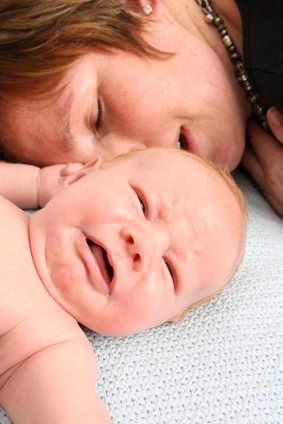Guest post by Lauren Dzuris
 From the day you find out you’re pregnant, to the day your child is born, your life begins to change forever right before your eyes.You are no longer responsible for simply yourself, but now for a child as well.
From the day you find out you’re pregnant, to the day your child is born, your life begins to change forever right before your eyes.You are no longer responsible for simply yourself, but now for a child as well.
Seeing your body transform into a motherly figure in just 9 months is undoubtedly an amazing sight.
While you excitedly count down to your due date, it isn’t always clear what’s ahead. In fact, it is very common to mistakenly expect the first days with baby to be “perfect,” after all, you have spent 9 months dreaming about the day you get to welcome your bundle of joy into the world.
You have probably pictured yourself playing with the baby, happy, full of energy and ready to leave the hospital. Yes, giving birth to your child is breathtaking and the most amazing accomplishment…but don’t beat yourself up if you’re not 100% happy right away.
It’s common for women to go through what many call the “baby blues,” a condition recognized in the medical profession as postpartum depression.
Women with this type of depression typically experience some anxiety about having and caring for their newborn. They may also miss the attachment they felt to the baby while pregnant. Experiencing a whole new lifestyle can be overwhelming. If you are a new mom and are experiencing these types of feelings, you are not alone and should speak with your doctor right away so you can start enjoying all motherhood has to offer.
Here are some tips for taking those first steps.
Speak with your doctor: Typically a doctor will recommend a checkup within 6 weeks after you have given birth. If you notice that you’re severely, or even moderately, depressed, don’t be afraid to tell your doctor right away. This is a common problem among new mothers, you’re not alone!
Ask for help: Having a baby can be exhausting. Don’t be afraid to ask for help from friends and family. Everyone loves a newborn and those who are involved in your life will be happy to watch the baby while you take a nap, tend to other chores or take some personal time for yourself.
Friends and family: Just talking to your friends and family, as well as your spouse, can help relieve some of your stress. Vent, tell them why you’re upset and how you are feeling. Don’t hesitate to ask for help or advice when you need it.
Rest: Get your rest. In order to stay healthy, both mentally and physically, you need your rest. To take care of your baby, you need to take care of yourself first.
Although postpartum depression doesn’t affect all women, according to the Center for Disease Control and Prevention, approximately 950,000 women each year experience this condition. Once you admit you need help, you can only get better – if you think you may experiencing postpartum depression, talk to your doctor right away.
Lauren Dzuris runs FindMyCarSeat, a website that can help new parents find a car seat, while giving them tips, and advice on everything from pregnancy to parenting.







